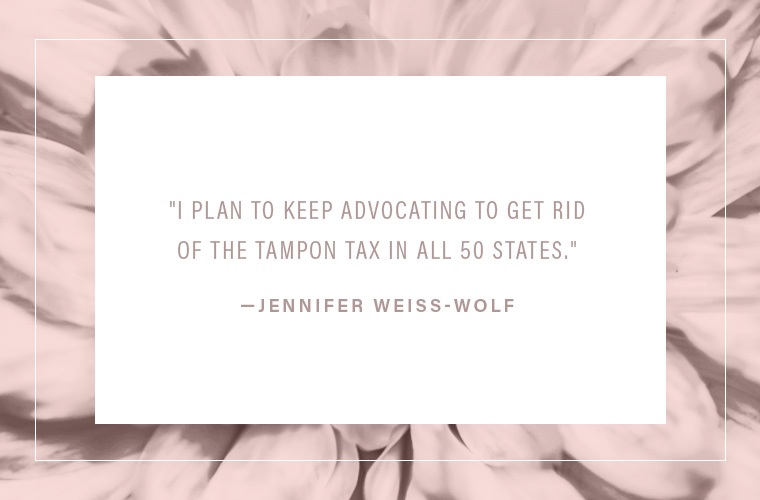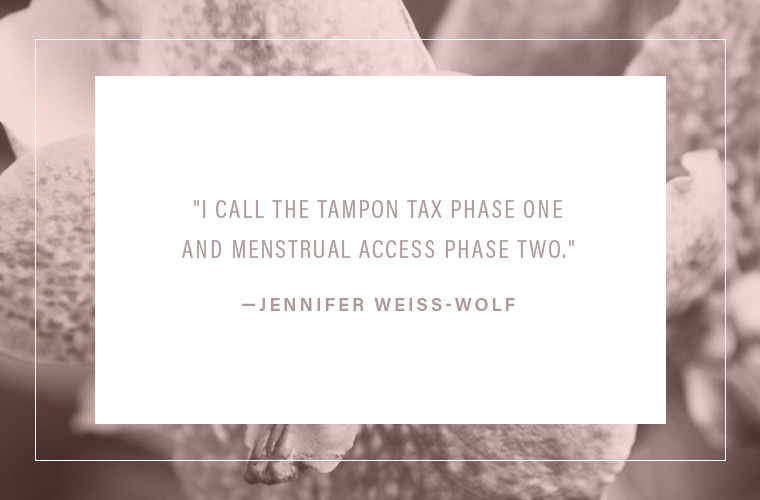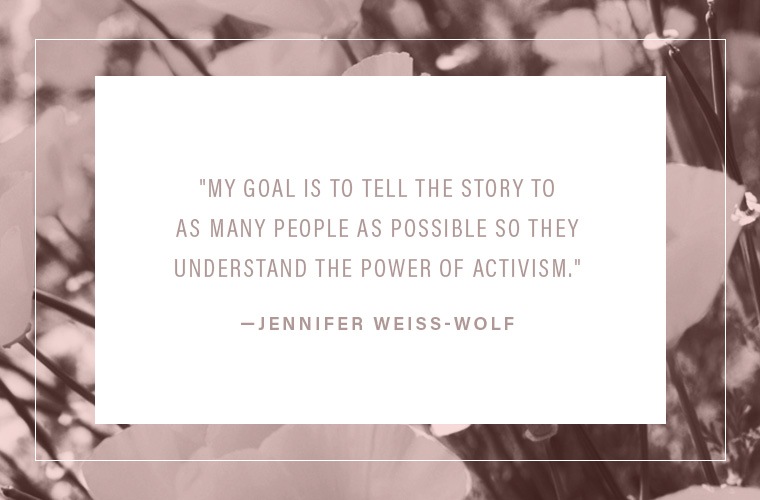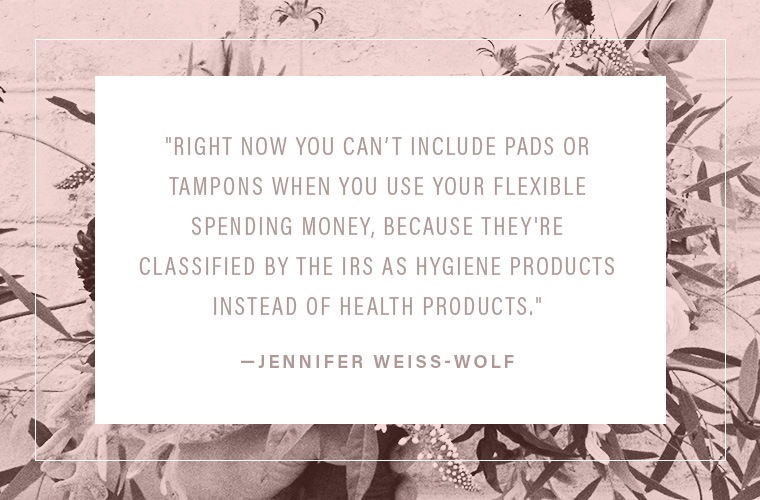Our editors independently select these products. Making a purchase through our links may earn Well+Good a commission
Meet the Wonder Woman of menstrual realness
A Q&A with the lawyer and legal activist leading the anti-tampon tax charge in all 50 states on how she's fighting for menstrual access for women and girls.
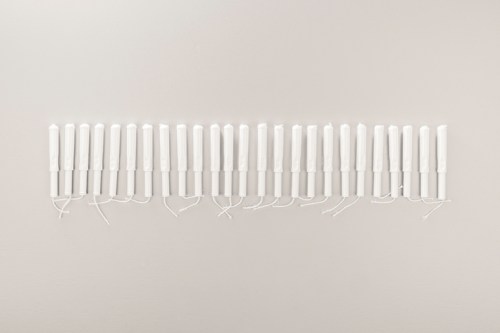
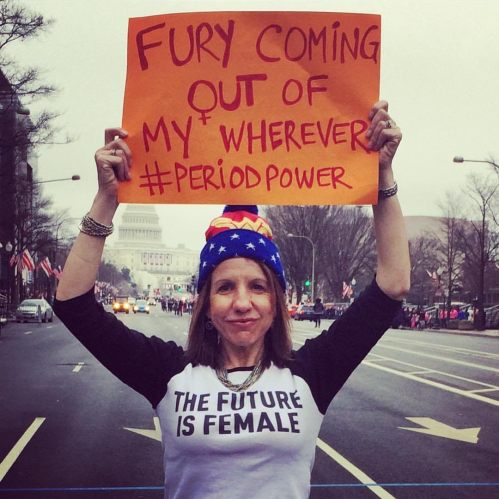
When attorney Jennifer Weiss-Wolf logged in to Facebook on New Year’s Day back in 2015, she didn’t set out to do anything extraordinary—but like most superhero origin stories, sometimes the simplest thing can set off a chain reaction that results in something pretty damn incredible.
In the case of the New Jersey-based lawyer, she just came across a flyer on her newsfeed asking for volunteers to help a local food pantry collect tampons and pads for low-income girls and women. Why, she wondered, were period products so inaccessible—and so expensive?
In an attempt to answer the question, she discovered a little-known law that’s been dubbed the tampon tax. It allows states to charge more for pads and tampons by listing them as a luxury good (alongside items like cigarettes and high-end automobiles), which means they’re not eligible for a sales-tax exemption the way items considered to be necessities are, including food and prescription medication. It might sound like a small thing, but it adds up quickly—in California alone, for example, people pay over $20 million per year in taxes for period products.
“It was really a light-bulb moment when I was like, Why isn’t anyone talking about this?” Weiss-Wolf recalls. After her initial WTF moment, she started researching everything she could about the current state of menstrual equity in America. Eventually, she organized her outrage into a powerful essay, which was published in The New York Times in 2015.
“It was really a light-bulb moment when I was like, Why isn’t anyone talking about this?”
Since then, she’s helped introduce legislation to dismantle the tampon tax in 24 states—and succeeded in having it outlawed in 4—all of which have been bipartisan bills. “It’s popular and it crosses political lines,” Weiss-Wolf says. “[It shows you] that this is right, that people are listening, and people are believing in this.” (Oh, and she’s penned a book, Periods Gone Public, which will be released this October.)
Her side hustle (by day she’s the vice president of development for the Brennan Center for Justice at New York University Law School) to make the tampon tax illegal in all 50 states and ensure it’s easier for low-income girls and women to gain access to free or affordable period products has led us to dub Weiss-Wolf the Wonder Woman of menstrual realness.
“It’s kind of bizarrely become my life mission in a short amount of time, and I can’t think of a world where I don’t think about this,” she says. It doesn’t get more super or heroic than that.
Here, the activist and author discusses everything that’s happening on this new front of the feminist movement.
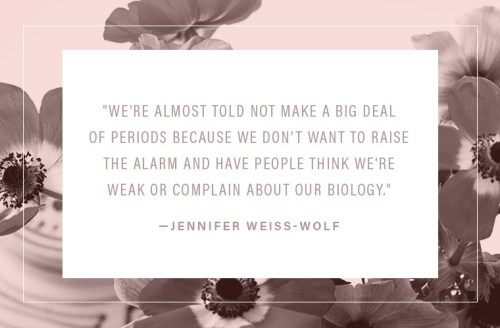
Why take on the tampon tax?
Given my day job as a lawyer and policy advocate, I have a view of the world that is: “How can you leverage the law, thought leadership, and public discussion to create change?”
I thought, if any issue has to be right for it, it has to be something like this. We don’t talk about periods at all, let alone talk about the economics, let alone talk about it in policy landscape. But we all have perspectives about menstruation that guide how we live our lives—and it affects us so much more than what we give it credit for. We’re almost told not make a big deal of periods because we don’t want to raise the alarm and have people think we’re weak or complain about our biology.
“We all have perspectives about menstruation that guide how we live our lives—and it affects us so much more than what we give it credit for.”
Something that’s actually such a prevalent part of our lives is so absent from our public discourse—and the rules and the ideas and laws by which we live. It makes no sense, it’s so illogical. That’s kind of what I was trying to solve.
When it comes to talking about menstruation there’s this incredibly leveled playing field. Often times I find that even the defense and legal people think they can empathize—but judgmental things can fall out of their mouths like, “I just can’t believe what I’m hearing.” Everybody can appreciate what that feeling of terror and horror is when you get your period and you don’t have an way to manage it.
That’s an important point: The tampon tax lies at an intersection of inequality—both gendered and socio-economic. Can you explain how these issues converge?
In New York, the litigation that we filed was actually just a gateway to talk about periods and poverty, and what it means to have a period in this society. It was a way to open up that conversation so that we can start talking about what people truly need when it comes to managing menstruation, and thinking about if there are other ways to use our current system of laws and policies to improve that reality.
Storytelling is what inspires policy change and legal change and social change to coalesce. It also validates it—especially in a most pragmatic sense for legislators, who need to know that their communities want this and have their back and will get them reelected. So I’ve done as much story collection as I can.
“The idea that this girl’s experience was that cumbersome for something so natural, it just brought it back home.”
These stories do sort of double duty because they highlight theses issues around menstruation. But they all kind of sneak in some other issues of poverty that people may not always be emphatic about—you got to hear directly from these women’s experiences about the indignities of having their periods while being homeless, [for example].
One story that I’ll share is of a girl getting her period at school and, because the school didn’t offer any menstrual products in the bathroom, it required [the girl] to explain to her teacher why she was going to the nurse’s office, get a pass, and have the pass signed by the nurse to go back to class. She didn’t get the nurse to sign the pass—so when she got back to class, she got detention. The idea that this girl’s experience was that cumbersome for something so natural, it just brought it back home.
And what’s the current status of the tampon tax across the country?
Over the past two years [anti-tampon tax] ideas have materialized to protection and laws. Even bills that haven’t passed have really started laying the groundwork for a truly high level of public political discourse about menstruation and why it’s been absent from our public and political sphere, let alone people’s discussion and conversations around health.
“I plan to keep advocating to get rid of the tampon tax in all 50 states.”
Some of the states that have been at the forefront are New York, Illinois, California, Connecticut, Ohio, and Florida. Those are the states where there are legislatures ready to go. I plan to keep advocating to get rid of the tampon tax in all 50 states.
The fight is long from over—4 states did away with it, 10 didn’t have it in the first place, but 36 still do. So those fights still exist.
What are some of the other layers of menstrual rights you’re looking at?
The other policy that I kind of dreamt up—but didn’t think that there would be a venue for it so quickly—were these menstrual access laws. They basically call upon any level of government—it could be municipal, it could be state government—to consider the agencies over which it has jurisdiction, and then ensure that menstrual products are part of those agencies’ regular budgets and activities.
Here in New York City, we convened what we called a round table and brought in advocates from all across the city who work with, or whose clients are, low-income women and girls. Whether it was after-school programs or health providers or shelters or food pantries, they all came to the table and talked about menstruation—how they see it affecting the live of their clients. We came up with three bills—that are now laws—demanding the provision of free menstrual products in public schools through the Department of Education, the shelters through the Department of Homeland Services, and the jails through the Department of Correction.
It doesn’t have to go to contentious state legislatures and high-profile governors—you can go to your local school board and do it.
Those laws were drafted, introduced, debated, passed, and signed by the mayor all within about a six-month time period. And when they were passed they were sort of the first and best of their kind in a world. That’s now my goal—what I’m working toward. I call the tampon tax phase one and menstrual access phase two.
For example, I worked with the Superintendent of Los Angeles County—they have oversight of the juvenile detention centers. They drafted an ordinance that made sure that menstrual products are freely available in juvenile detention centers, and other cities and counties and states have introduced laws or budget lines to do the same. So Colorado uses the budget to make sure that menstrual products will be freely available to state prisoners. In Columbus, Ohio, same for all government buildings. In Dane County Wisconsin—which is where Madison is—same for all the county buildings.
The goal is to replicate that as far and wide as it can be done. What’s nice about it is that it doesn’t have to go to contentious state legislatures and high-profile governors—you can go to your local school board and do it. The town where I live, we did it at the public library, [since] that was the place where the town council had oversight. So it’s neat and it affects people at all different levels.
How else can people help?
Now that this story is told and these ideas are cemented—because I put them in words and somebody published them—my goal is to tell the story to as many people as possible. [I want them to] understand the power of activism; that it’s possible to raise your voice and make a difference.
On this issue in particular, people can join the fight as advocates in their own communities or by elevating their voice on social media and in the circles of people that they know. Because the more that we are talking about this, the more we all realize we are happy to talk about it and the time is right for change.
“[I want people to] understand the power of activism; that it’s possible to raise your voice and make a difference.”
I work with tons of activists, and there’s people involved in so many facets of this work. I just happened to have picked policy because that is the one that resonates with me.
And I’m so proud to be part of it. There’s a real electricity and a real synergy—you know magic when you see it. I’m quite convinced that there’s something utterly other-worldly about what I stumbled into here. I know that sounds insane, but it’s true.
Any goals you’re focused on for the future—immediate or more long-term?
I focus very squarely on the politics related to the economics of menstruation and the intersections of menstruation and women’s health and lives in poverty. I try to learn as much as I can in everything I do and every conversation we have. And I then translate it to being rather aggressive with our policymakers to take on this issue. So, my immediate goal is to take the publication of this book and tell this story on as many college campuses and as many mediums as I can to inspire more activism around this issue.
“Let’s look at these through the lens of menstruation and see if we can’t do better.”
And then there are several pieces of legislation that I’m working on with a congresswoman from New York, Grace Meng, who introduced the Menstrual Equity for All Act of 2017. She’s super creative and has forward-thinking ideas, like income tax credits for low-income people who buy menstrual products and flexible spending account allowances. Right now you can’t include pads or tampons when you use your flexible spending money because they’re classified by the IRS as hygiene products instead of health products. So it’s a very simple fix to get the IRS to change that—or it’s presumably a simple fix. But the effect of doing so would be [that you can] use pre-tax dollars to buy tampons and pads.
I think about everything—federal benefits, health care policy, prison policy, education, philanthropy, gender equity policies—and say, “Let’s look at these through the lens of menstruation and see if we can’t do better.” And that’s ultimately where I want this to go.
Jennifer Weiss-Wolf used her passion for public policy direct her advocacy. Here’s how to use your own passions to change the world. Plus, why now’s the perfect time to become an activist.
Sign Up for Our Daily Newsletter
Get all the latest in wellness, trends, food, fitness, beauty, and more delivered right to your inbox.
Got it, you've been added to our email list.




